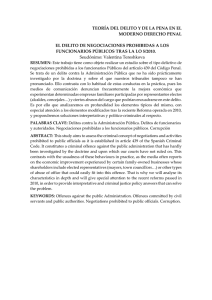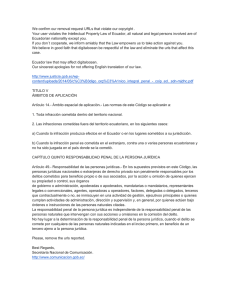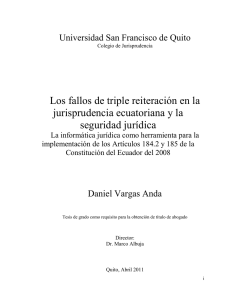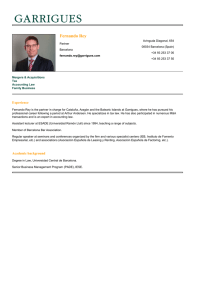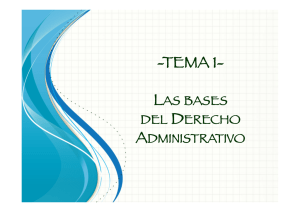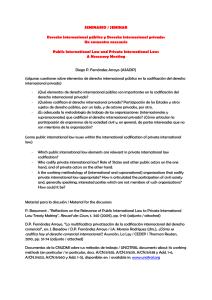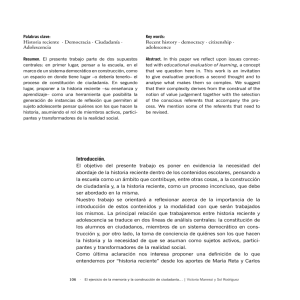April 11, 2016 VIA ECF Catherine O`Hagan Wolfe
Anuncio
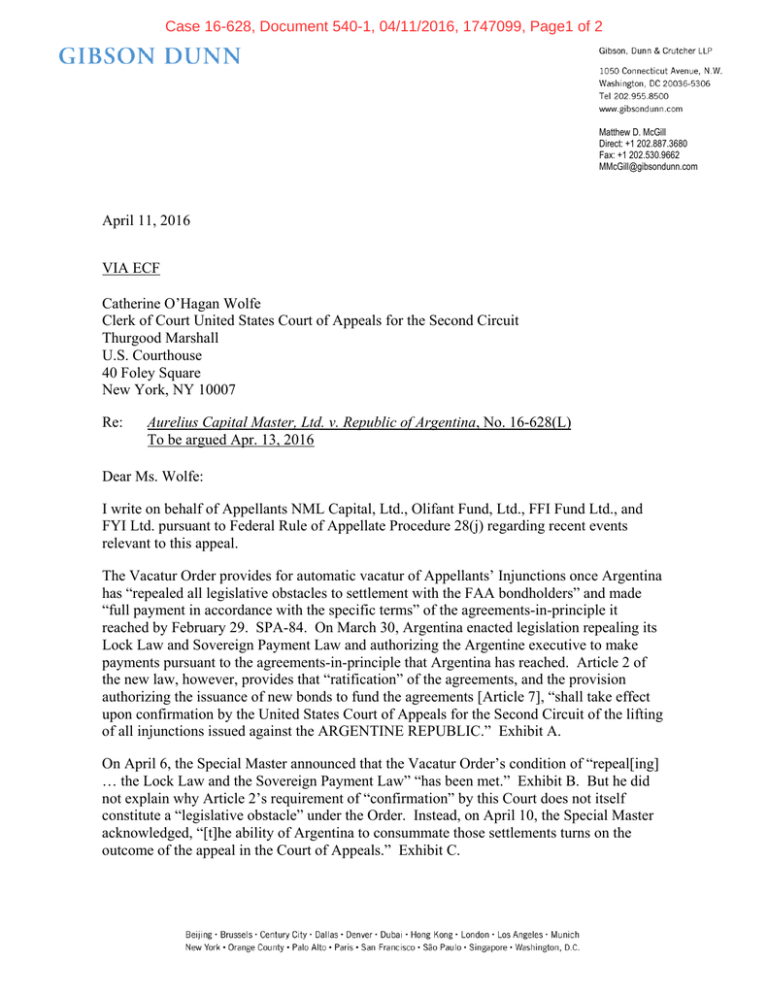
Case 16-628, Document 540-1, 04/11/2016, 1747099, Page1 of 2 Matthew D. McGill Direct: +1 202.887.3680 Fax: +1 202.530.9662 [email protected] April 11, 2016 VIA ECF Catherine O’Hagan Wolfe Clerk of Court United States Court of Appeals for the Second Circuit Thurgood Marshall U.S. Courthouse 40 Foley Square New York, NY 10007 Re: Aurelius Capital Master, Ltd. v. Republic of Argentina, No. 16-628(L) To be argued Apr. 13, 2016 Dear Ms. Wolfe: I write on behalf of Appellants NML Capital, Ltd., Olifant Fund, Ltd., FFI Fund Ltd., and FYI Ltd. pursuant to Federal Rule of Appellate Procedure 28(j) regarding recent events relevant to this appeal. The Vacatur Order provides for automatic vacatur of Appellants’ Injunctions once Argentina has “repealed all legislative obstacles to settlement with the FAA bondholders” and made “full payment in accordance with the specific terms” of the agreements-in-principle it reached by February 29. SPA-84. On March 30, Argentina enacted legislation repealing its Lock Law and Sovereign Payment Law and authorizing the Argentine executive to make payments pursuant to the agreements-in-principle that Argentina has reached. Article 2 of the new law, however, provides that “ratification” of the agreements, and the provision authorizing the issuance of new bonds to fund the agreements [Article 7], “shall take effect upon confirmation by the United States Court of Appeals for the Second Circuit of the lifting of all injunctions issued against the ARGENTINE REPUBLIC.” Exhibit A. On April 6, the Special Master announced that the Vacatur Order’s condition of “repeal[ing] … the Lock Law and the Sovereign Payment Law” “has been met.” Exhibit B. But he did not explain why Article 2’s requirement of “confirmation” by this Court does not itself constitute a “legislative obstacle” under the Order. Instead, on April 10, the Special Master acknowledged, “[t]he ability of Argentina to consummate those settlements turns on the outcome of the appeal in the Court of Appeals.” Exhibit C. Case 16-628, Document 540-1, 04/11/2016, 1747099, Page2 of 2 Catherine O’Hagan Wolfe April 11, 2016 Page 2 This underscores a central defect in the Vacatur Order. Although satisfaction of the Order’s conditions already is disputed, the Order anticipates no further judicial action to determine whether they are satisfied. This is particularly troubling in view of the Special Master’s incorrect statement that “the lifting of the Injunction … occurred on March 2,” when no condition precedent had even arguably been satisfied, but suggests that vacatur has not yet taken effect because it “has been appealed by several parties.” Exhibit C. The finding of facts predicate to vacatur of an Injunction, with irreversible impact on the parties, cannot be delegated to the defendant. Respectfully submitted, /s/ Matthew D. McGill Matthew D. McGill Case 16-628, Document 540-2, 04/11/2016, 1747099, Page1 of 16 EXHIBIT A Case 16-628, Document 540-2, 04/11/2016, 1747099, Page2 of 16 OFFICIAL BULLETIN of the Argentine Republic https://www.boletinoficial.gov.ar/pdf/linkQR/SGUvZHk2ZUNYbUErdTVReEh2ZkU0dz09 PUBLIC DEBT Law 27249 Laws No. 26,017, No. 26547, No. 26,886 and No. 26,984. Repealed. Law No. 27198. Modified. Passed: March 31, 2016 Enacted: March 31, 2016 The Senate and Chamber of Deputies of Argentina having met in Congress, etc. pass into Law: ARTICLE 1st – Laws No. 26,017, 26,547, 26,886, 26,984 and their supplementary rules and regulations, as well as any other laws, decrees or regulations that are contrary to or incompatible with the provisions hereof, are hereby repealed. ARTICLE 2nd – The ratification of the agreements proposed in Article 5th, the authorization conferred to the Implementing Authority in Article 6th, as well as the provisions in Articles 7th, 8th, 9th, 10th, 11th, 12th, 13th and 15th, all of this law, shall take effect upon confirmation by the United States Court of Appeals for the Second Circuit of the lifting of all injunctions issued against the ARGENTINE REPUBLIC. ARTICLE 3rd – Article 42nd of Law No. 27,198 is hereby modified and shall henceforth read as follows: Article 42nd – The Executive Branch, through the Ministry of Treasury and Public Finance, is authorized to pursue the normalization of the public debt services referred to in Article 41 of this law, under the terms of Article 65 of the Financial Administration and the National Public Sector Control Systems Law 24,156, and modifications to it or to the Public Debt Normalization and Credit Recovery Act, thus empowering the Executive Branch to continue negotiations and to undertake all such acts as may be necessary to bring said process to conclusion. The Ministry of Treasury and Public Finance shall provide the Honorable National Congress quarterly status reports on the progress of the discussions and accords arrived at during the negotiation process. Such reports shall include an up-to-date database identifying the agreements that have been reached, the court or arbitral suits that have been terminated, the amounts of principal and the amounts paid or to be paid in each settlement and how much of the debt issuing capacity authorized in Article 7th of the Public Debt Normalization and Credit Recovery Act has been used. Certified copies of the agreements that have been reached, as well as their translation into Spanish as necessary, shall also be included. On the same reporting schedule, the Ministry of Treasury and Public Finance shall report on the progress of efforts to normalize debt service on the government bonds issued within the framework of the public debt restructuring provided for in Decrees 1735/2004 and 563/2010. Firm judicial pronouncements issued against the provisions of Law 25,561, Decree 471 dated March 8, 2002, and their supplementary regulations affecting those bonds, are included in the deferral indicated in Article 41 hereof. ARTICLE 4th – In the event that the provisions proposed in Article 2nd of this law do not go into effect for reasons provided for in said Article, the Implementing Authority may undertake new negotiations with those bondholders (and/or their representatives) that were eligible for the swap set forth in Decree 1734 dated December 9, 2004 and its supplementary regulations, but were not presented for that swap or the one under Decree 563 dated April 26, 2010 (Eligible Public Bonds), provided that any agreements the Implementing Authority may sign with those creditors and any repayment and/or restructuring proposals the Implementing Authority may extend shall be subject to approval by the Nation's Congress. ARTICLE 5th – The repayment agreements entered into by and between the Argentine Republic and the holders of Eligible Public Bonds (and/or their representatives), which as Appendix I, an English copy and its translation into Spanish are included, are an integral part of this law, are hereby ratified The Ministry of Treasury and Public Finance is authorized, as the Implementing Authority under this law, to extend the maturity deadlines set forth in said repayment agreements. ARTICLE 6th – The Implementing Authority is authorized to: i) enact amendments and/or addenda to the repayment agreements referred to in the preceding Article as long as same do not modify their purpose, financial conditions and their terms and conditions; and, [stamp: THE NATION'S CHAMBER OF DEPUTIES – OFFICE OF THE SPEAKER] [signatures] Case 16-628, Document 540-2, 04/11/2016, 1747099, Page3 of 16 ii) to take any actions as may be needed to repay the debt with the holders of Eligible Public Bonds (and/or their representatives) that were not covered by the repayment agreements referred to in the preceding Article, including subscribing agreements and other instruments. In order to give effect to subscribing the agreements referred to in the previous paragraph, the Implementing Authority may offer: a) All holders of Eligible Public Bonds, a payment equivalent to the amount of principal owed on their bonds plus fifty percent (50%) of that amount of principal (Base Offer). In no case may the amount to be paid be higher than the amount recognized in any judgment issued in regard to said bonds, plus the updated legal amount for statutory interest as of January 31, 2016. The Base Offer shall be formalized and implemented by: i) signing debt repayment agreements; and ii) a national and international cash tender offer (an "oferta de pago en efectivo contra entrega" in Spanish) upon presentation of Eligible Public Bonds. For holders of Eligible Public Bonds who initiated claims in the United States District Court for the Southern District of New York, as members of a class-action suit, there is authorization to agree to an additional amount to settle the administrative expenses needed to notify the members of that class, under the terms of the Agreement set forth in paragraph 4 of Appendix I. The National Executive Branch will not assume any additional expense or charge with respect to the remaining holders of Eligible Government Bonds encompassed in the Base Offer. b) Those holders of Eligible Public Bonds whose claims were covered by the court orders issued by the United States District Court for the Southern District of New York on February 23, 2012, and modified on November 21, 2012 (the "Original ‘Pari Passu’ Order") and on October 30, 2015 (the "Me Too ‘Pari Passu’ Order” and, together with the Original "Pari Passu" Order, the "Pari Passu Orders"), the Base Offer stipulated in section a) above, or, at their election, the following proposal (the "'Pari Passu' Offer"): i) to those holders of Eligible Public Bonds included under the "Pari Passu" Orders, which had a monetary judgment declared before February 1, 2016, recognizing the debt arising from the Eligible Public Bonds they hold, a payment equal to seventy percent (70%) of the legal claim (which includes the amount recognized in that judgment plus legal interest accruing from the date of the judgment through January 31, 2016), and ii) to those holders of Eligible Public Bonds included under the "Pari Passu" Orders that did not have a monetary judgment declared before February 1, 2016, recognizing the debt arising from the Eligible Public Bonds they hold, a payment equal to seventy percent (70%) of the legal claim (including the principal owed plus accrued amounts at the contractual interest rate and the statutory interest rate on the contractual interest rate through January 31, 2016, pursuant to the laws of the State of New York, UNITED STATES OF AMERICA). ARTICLE 7th –Provisions are to be made, through the Implementing Authority and as subject to this law, to issue National Treasury bonds and/or enter into contracts for other government borrowings for up to an original nominal value of U.S. dollars and/or its equivalent in other currencies that may be needed to meet the required payments under this law as long as such payments do not exceed the sum of twelve billion five hundred million u.s. dollars (USD 12,500,000,000) and/or its equivalent in other currencies, thereby expanding, consequently, the General National Budget for Fiscal Year 2016, approved by Law No. 27,198. The Implementing Authority shall allocate the proceeds of the issuances referred to in the previous paragraph to repayment of the debt described in this law. In the event the amount of the issuance exceeds the payment amount required under the present law, the overage will be charged against the existing authorization for public debt provided for in the General Budget of the National Administration for Fiscal Year 2016, approved by Law 27,198. ARTICLE 8th – Holders of Eligible Public Bonds that want to participate in a repayment transaction that may be held within the framework of this law, including the creditors who signed the agreements in Appendix I and those who accept the proposals set forth in Article 6th, must waive all other rights they may have under the bonds in question, including any rights that may have been recognized in any legal or administrative ruling, arbitration award or decision by any other authority, regardless of jurisdiction, and waive and release the Argentine Republic from any legal, administrative, arbitration or other type of proceeding that has been initiated or may be initiated in the future in relation to the bonds in question or to the obligations of the Argentine Republic arising from them, including any actions intended to collect principal or interest service on said bonds or any other appurtenant accrual or expense. ARTICLE 9th – The Implementing Authority is authorized to include clauses establishing the extension of jurisdiction to foreign courts, and providing for a waiver of the right to raise the defense of sovereign immunity, exclusively, with respect to the jurisdiction being extended and in relation to the agreements that may be signed and issuances of public debt that may be undertaken, as set forth in this law and subject to the inclusion of the so-called "collective action clauses" and "pari passu" clause, in accordance with current practice on international capitals markets. Case 16-628, Document 540-2, 04/11/2016, 1747099, Page4 of 16 The waiver of the right to raise the defense of sovereign immunity shall not imply that there has been a waiver of immunity by the Argentine Republic with regard to an attachment of the property listed below: a) any Central Bank Of Argentina reserves; b) any property belonging to the public domain located in the territory of the Argentine Republic, including those covered by Articles 234 and 235 of the Federal Civil and Commercial Code; c) any property located within or without the Argentine territory that might provide an essential public service; d) any property (whether in the form of cash, bank deposits, securities, third-party obligations or any other method of payment) owned by the Argentine Republic, its government agencies and other government entities related to the implementation of the budget, within the scope of Articles 165 to 170 of the Permanent Supplemental Law of Budget No. 11,672 (t.o. 2014); e) any property attained by the privileges and immunities of the Vienna Convention on Diplomatic Relations of 1961 and the Vienna Convention on Consular Relations of 1963, including, but not limited to, property, establishments and accounts of Argentine missions; f) any property used by a diplomatic, governmental or consular mission of the Argentine Republic; g) taxes and/or royalties owed to the Argentine Republic and the rights of the Argentine Republic to collect taxes and/or royalties. h) any property of a military nature or under the control of a military authority or defense agency of the Argentine Republic; i) any property that makes up part of the cultural heritage of the Argentine Republic; and j) property protected by any law of sovereign immunity that might apply. ARTICLE 10th –The Implementing Authority is authorized to undertake all necessary acts to fulfill the provisions of this law, including, but not limited to: a) setting the time periods and deadlines for participating in the debt repayment offers; b) setting the time periods, deadlines, methods and procedures for issuing the new public bonds; c) designating the financial institutions that will be participating in the placement of the new public bonds and entering into contracts for other public credit borrowings; d) signing agreements with the financial entities placing the new public bonds to be issued, and providing, for such purposes, for the payment of commissions at market conditions, but which in no event may exceed zero point twenty percent (0.20%) of the amount of issuance; e) preparing and registering a program of public bonds with the organizations that control the leading international capital markets; f) signing agreements with fiduciary agents, payment agents, information agents, custody agents, registration agents and risk ratings agencies as may be needed for both the debt repayment transactions and the issuance and placement of the new public bonds, and providing for the payment of the corresponding fees and expenses at market conditions; and g) paying other registration, printing, distribution of prospectuses, translation and other necessary related expenses, all of which must be at market conditions, in order to fulfill the provisions of this law. ARTICLE 11th – The transactions covered by this law are exempt from the payment of all federal taxes, fees and assessments that may exist now or be instituted in the future, and from currency exchange restrictions that might apply to the transactions contemplated in this Law. ARTICLE 12th –The transactions covered by this law are exempt from the provisions of Articles 7th and 10th of Law No. 23,928 and modifications thereto, and from Article 765 of the Federal Civil and Commercial Code. ARTICLE 13th – The Implementing Authority shall, within SIXTY (60) days of performance of the condition in Article 2nd hereof, adopt all necessary measures intended to normalize the servicing of public bonds issued within the framework of the public debt restructuring set forth in Decrees 1,735 dated December 9, 2004 and 563, dated April 26, 2010 (hereinafter the "Restructured Public Bonds"), including: i) the normalization of the situation with The Bank of New York Mellon as fiduciary agent within the framework of the Trust Agreement dated June 2, 2005, amended on April 30, 2010 (the "Trust Agreement"); ii) if necessary, to engage another institution to fulfill the fiduciary agent's duties as set forth in the Trust Agreement; and Case 16-628, Document 540-2, 04/11/2016, 1747099, Page5 of 16 iii) the issuance of instructions that may be needed to process the transfer of funds deposited in the "Law No. 26,984 Sovereign Payment of Restructured Debt Fund" ["Fondo Ley No. 26.984 Pago Soberano de Deuda Reestructurada" in Spanish) of Nación Fideicomisos Sociedad Anónima at the Central Bank of Argentina to the corresponding accounts at The Bank of New York Mellon, or to the entity that replaces it as fiduciary agent under the Trust Agreement, in the Central Bank of Argentina in order to apply them to the payment of those bonds. Until such time that the contractual situation with The Bank of New York Mellon as fiduciary agent under the Trust Agreement is normalized, the Implementing Authority may transfer the corresponding funds for future maturity dates of the Restructured Public Bonds to Nación Fideicomisos Sociedad Anónima, the entity hereby designated as the temporary payment agent (for which purpose the Implementing Authority shall reach an agreement with that entity as to the terms of the designation) for subsequent transfer to the fiduciary agent under the Trust Agreement, without the provisions of this article implying any modification whatsoever to said Trust Agreement. ARTICLE 14th – In the event that the provisions proposed in Article 2nd of this law do not go into effect for reasons provided for in said Article, the Implementing Authority may transfer the funds allocated to future maturities of the Restructured Public Bonds to Nación Fideicomisos Sociedad Anónima as the temporary payment agent for subsequent transfer to the fiduciary agent under the Trust Agreement, without the provisions of this Article implying any modification whatsoever to said Trust Agreement. ARTICLE 15th – The Ministry of Treasury and Public Finance is designated as the Implementing Authority of this law, allowing it to decree any clarifications or supplementary rules that may be necessary to cause the fulfillment of this policy. ARTICLE 16th – The Cabinet Chief has the power to make any budgetary adjustments that may be appropriate to fulfill the provisions of this law. ARTICLE 17th – The payments anticipated in this law shall be charged to the budget item "Public Debt Expenses and Commissions" of Jurisdiction 90. ARTICLE 18th – Under the auspices of the Honorable Congress of the Nation, a Standing Bicameral Committee to Monitor and Oversee the Contract Arrangements and Payment of the Nation's Foreign Debt is created, and it shall be comprised of ten (10) Senators and ten (10) Deputies, appointed by the Speakers of the respective Chambers from nominees proposed by the parliamentary blocks in proportion to their political representations, and which shall be governed by the internal rules of operation as may be established for it and whose primary purpose shall be to monitor the progress, management and payments of the Nation's foreign debt. The Committee may request information, documentation or data from national, provincial or municipal agencies, whether centralized, de-centralized or independent, and from both national and international financial entities, whether public or private; and any other organization as may be necessary to fulfill its duties. ARTICLE 19th – This law is public policy and shall take effect on the date of its publication in the Official Gazette. ARTICLE 20th – The EXECUTIVE BRANCH is so notified. PASSED IN THE ARGENTINE CONGRESS'S SESSIONS CHAMBER, IN BUENOS AIRES, ON THE THIRTY-FIRST DAY OF MARCH, TWO THOUSAND SIXTEEN. ---ENTERED UNDER NO. 27249--FEDERICO PINEDO.---EMILIO MONZÓ.---Eugenio Inchausti.---Juan P. Tunessi. NOTE: The Appendix or Appendices that are an integral part of this Law are published on the online edition of the BORA ---www.boletinoficial.gov.ar--- and may also be viewed at the Main Office of this National Department (Suipacha 767 – Autonomous City of Buenos Aires). Date of Publication: 04/01/2016 Sincerely, [stamp: CHAMBER OF DEPUTIES OF ARGENTINA] [signatures] Case 16-628, Document 540-2, 04/11/2016, 1747099, Page6 of 16 April 7, 2016 I hereby certify that I am a professional translator, that I abide by the Code of Ethics and Professional Practice of the American Translators Association, that I am fluent in Spanish and English, that I have employed a team of professional translators, and that we have translated, to the best of our knowledge, the attached document entitled Argentine Law From Spanish into English Signed, Cathleen Waters Founder, New World Medium Translator of French, Spanish, Italian, Portuguese and English American Translator’s Association Membership no. 257918 InfoLEG - Ministerio de Economía y Finanzas Públicas - Argentina Case 16-628, Document 540-2, 04/11/2016, 1747099, Page7 of 16 Page 1 of 4 Esta norma fue consultada a través de InfoLEG, base de datos del Centro de Documentación e Información, Ministerio de Economía y Finanzas Públicas. DEUDA PÚBLICA Ley 27249 Leyes N° 26.017, N° 26.547, N° 26.886 y N° 26.984. Derogación. Ley N° 27.198. Modificación. Sancionada: Marzo 31 de 2016 Promulgada: Marzo 31 de 2016 El Senado y Cámara de Diputados de la Nación Argentina reunidos en Congreso, etc. sancionan con fuerza de Ley: ARTÍCULO 1° — Deróganse las leyes 26.017, 26.547, 26.886, 26.984 y sus normas reglamentarias y complementarias, como así también toda otra ley, decreto o norma que sea contraria o incompatible con las disposiciones de la presente ley. ARTÍCULO 2° — La ratificación de los acuerdos contemplados en el artículo 5°, la autorización concedida a la Autoridad de Aplicación en el artículo 6°, como así también las disposiciones de los artículos 7°, 8°, 9°, 10, 11, 12, 13 y 15, todos de la presente ley, entrarán en vigencia a partir de la confirmación por parte de la Cámara de Apelaciones del Segundo Circuito de los Estados Unidos de América del efectivo levantamiento de todas las medidas cautelares (“injunctions”) dictadas contra la República Argentina. ARTÍCULO 3° — Modifícase el artículo 42 de la ley 27.198, el que quedará redactado de la siguiente manera: Artículo 42: Autorízase al Poder Ejecutivo nacional, a través del Ministerio de Hacienda y Finanzas Públicas, a proseguir con la normalización de los servicios de la deuda pública referida en el artículo 41 de la presente ley, en los términos del artículo 65 de la Ley de Administración Financiera y de los Sistemas de Control del Sector Público Nacional 24.156, y sus modificaciones o de la Ley de Normalización de la Deuda Pública y de Recuperación del Crédito, quedando facultado el Poder Ejecutivo nacional para continuar con las negociaciones y realizar todos aquellos actos necesarios para su conclusión. El Ministerio de Hacienda y Finanzas Públicas informará trimestralmente al Honorable Congreso de la Nación, el avance de las tratativas y los acuerdos a los que se arribe durante el proceso de negociación. Dicho informe deberá incorporar una base de datos actualizada en la que se identifiquen los acuerdos alcanzados, los procesos judiciales o arbitrales terminados, los montos de capital y los montos cancelados o a cancelar en cada acuerdo y el nivel de ejecución de la autorización del nivel de endeudamiento que se otorga a través del artículo 7° de la Ley de Normalización de la Deuda Pública y de Recuperación del Crédito. Además, deberán acompañarse copias certificadas de los acuerdos alcanzados, así como su traducción al idioma español en caso de corresponder. Con igual periodicidad, el Ministerio de Hacienda y Finanzas Públicas deberá informar el avance de la gestión tendiente a la normalización del servicio de los títulos públicos emitidos en el marco de la reestructuración de la deuda pública dispuesta por los decretos 1.735/2004 y 563/2010. Los pronunciamientos judiciales firmes, emitidos contra las disposiciones de la ley 25.561, el decreto 471 de fecha 8 de marzo de 2002, y sus normas complementarias, recaídos sobre dichos títulos, están incluidos en el diferimiento indicado en el artículo 41 de la presente ley. ARTÍCULO 4° — En caso que las disposiciones contempladas en el artículo 2° de la presente ley no entren en vigencia por las causas previstas en dicho artículo, la Autoridad de Aplicación podrá llevar adelante nuevas negociaciones con los tenedores de títulos públicos (y/o sus representantes) que fueran elegibles para el canje dispuesto en el decreto 1.734 de fecha 9 de diciembre de 2004 y sus normas complementarias, que no hubiesen sido presentados a tal canje ni al dispuesto por el decreto 563 de fecha 26 de abril de 2010 (Títulos Públicos Elegibles), disponiéndose que los acuerdos que la Autoridad de Aplicación suscriba con dichos acreedores así como las propuestas de cancelación y/o reestructuración que la Autoridad de Aplicación formule quedarán sujetas a la aprobación del Congreso de la Nación. ARTÍCULO 5° — Ratifícanse los acuerdos de cancelación celebrados entre la República Argentina y los tenedores de Títulos Públicos Elegibles (y/o sus representantes), los que como Anexo I, en copia en idioma inglés y su traducción al idioma español, forman parte integrante de la presente ley. Se autoriza al Ministerio de Hacienda y Finanzas Públicas, como Autoridad de Aplicación de la presente ley, a prorrogar los respectivos plazos de vencimiento establecidos en los mencionados acuerdos de cancelación. ARTÍCULO 6° — Autorízase a la Autoridad de Aplicación a: http://www.infoleg.gob.ar/infolegInternet/anexos/255000-259999/259940/norma.htm 4/7/2016 InfoLEG - Ministerio de Economía y Finanzas Públicas - Argentina Case 16-628, Document 540-2, 04/11/2016, 1747099, Page8 of 16 Page 2 of 4 i) Efectuar enmiendas y/o adendas a los acuerdos de cancelación referidos en el artículo precedente en tanto no modifiquen su objeto, sus condiciones económicas y sus términos y condiciones; y, ii) Realizar todos los actos necesarios para cancelar la deuda con los tenedores de Títulos Públicos Elegibles (y/o sus representantes) que no estuvieren comprendidos en los acuerdos de cancelación referidos en el artículo precedente, incluyendo la suscripción de acuerdos y otros instrumentos. A fin de instrumentar la suscripción de los acuerdos referidos en el párrafo precedente, la Autoridad de Aplicación podrá ofrecer: a) A todos los tenedores de Títulos Públicos Elegibles, un pago equivalente al monto de capital adeudado de sus títulos con más un cincuenta por ciento (50%) de dicho monto de capital (Oferta Base). En ningún caso, el monto a pagar podrá ser superior al monto reconocido por cualquier sentencia dictada con relación a dichos títulos más la actualización legal correspondiente a la aplicación de intereses judiciales al 31 de enero de 2016. La Oferta Base se instrumentará e implementará mediante: i) La firma de acuerdos de cancelación de deuda; y ii) Una oferta nacional e internacional de pago en efectivo contra entrega de los Títulos Públicos Elegibles (“cash tender offer”, según su denominación en idioma inglés). Con respecto a los tenedores de Títulos Públicos Elegibles que hubieren iniciado reclamos ante la Corte de Distrito para el Distrito Sur de Nueva York, Estados Unidos de América, agrupados en una acción de clase, se autoriza a acordar una suma adicional para solventar los gastos administrativos necesarios para notificar a quienes se encuentran incluidos en la respectiva clase, según los términos del Acuerdo previsto en el apartado 4 del Anexo I. El Poder Ejecutivo nacional no asumirá ningún gasto ni cargo excedente respecto del resto de los tenedores de Títulos Públicos Elegibles abarcados en la Oferta Base; b) A aquellos tenedores de Títulos Públicos Elegibles cuyos reclamos estuvieran comprendidos en las órdenes judiciales dictadas por la Corte de Distrito para el Distrito Sur de Nueva York, Estados Unidos de América, en fecha 23 de febrero de 2012, y modificada en fecha 21 de noviembre de 2012 (la “Orden “Pari Passu” Original”) y en fecha 30 de octubre de 2015 (la “Orden “Pari Passu” Me Too” y conjuntamente con la Orden “Pari Passu” Original, las “Órdenes Pari Passu”), lo dispuesto en la Oferta Base prevista en el inciso a) precedente o, a su elección, la siguiente propuesta (la “Oferta “Pari Passu””): i) A aquellos tenedores de Títulos Públicos Elegibles que estuvieren alcanzados por las Órdenes “Pari Passu”, que contaren con una sentencia monetaria, dictada con anterioridad al 1° de febrero de 2016, que reconociere la deuda derivada de los Títulos Públicos Elegibles bajo su tenencia, un pago equivalente al setenta por ciento (70%) del reclamo legal (que incluye el monto reconocido en dicha sentencia y los intereses judiciales devengados desde la fecha de la sentencia hasta el 31 de enero de 2016), y ii) A aquellos tenedores de Títulos Públicos Elegibles que estuvieren alcanzados por las Órdenes “Pari Passu” que no contaren con una sentencia monetaria, dictada con anterioridad al 1° de febrero de 2016, que reconociere la deuda derivada de los Títulos Públicos Elegibles bajo su tenencia, un pago equivalente al setenta por ciento (70%) del reclamo legal (que incluye el capital adeudado más los importes devengados conforme la tasa de interés contractual y la tasa de interés reglamentaria “statutory interest rate” sobre la tasa de interés contractual hasta el 31 de enero de 2016, conforme las leyes del Estado de Nueva York, Estados Unidos de América). ARTÍCULO 7° — Dispónese, a través de la Autoridad de Aplicación y con cargo a la presente ley, la emisión de bonos del Tesoro de la Nación y/o la contratación de otras operaciones de empréstito público por hasta un valor nominal original de dólares estadounidenses y/o su equivalente en otras monedas, que sea necesario para cumplir con los pagos requeridos bajo la presente ley y en la medida que dichos pagos no excedan el monto de doce mil quinientos millones de dólares estadounidenses (U$S 12.500.000.000) y/o su equivalente en otras monedas quedando ampliado, en consecuencia, el Presupuesto General de la Administración Nacional para el Ejercicio 2016, aprobado por ley 27.198. La Autoridad de Aplicación destinará el producido de las emisiones referidas en el párrafo precedente a las cancelaciones de deuda previstas en la presente ley. En caso que el monto de emisión supere el monto de pago requerido bajo la presente ley, el excedente será imputado a la autorización existente de deuda pública prevista en el Presupuesto General de la Administración Nacional para el ejercicio 2016, aprobado por ley 27.198. ARTÍCULO 8° — Los tenedores de Títulos Públicos Elegibles que deseen participar de cualquier operación de cancelación que se realice en el marco de lo dispuesto en la presente ley, incluyendo a los acreedores que suscribieron los acuerdos del Anexo I y a los que acepten las propuestas previstas en el artículo 6°, deberán renunciar a todos los derechos que les correspondan, en virtud de los referidos títulos, inclusive a aquellos derechos que hubieran sido reconocidos por cualquier sentencia judicial o administrativa, laudo arbitral o decisión de cualquier otra autoridad, dictados en cualquier jurisdicción, y renunciar y liberar a la República Argentina de cualquier acción judicial, administrativa, arbitral o de cualquier otro tipo, iniciada o que pudiere iniciarse en el futuro con relación a los referidos títulos o a las obligaciones de la República Argentina que surjan de ellos, incluyendo cualquier acción destinada a percibir servicios de capital o intereses de dichos títulos o cualquier otro accesorio acrecido o gasto. ARTÍCULO 9° — Autorízase a la Autoridad de Aplicación a incluir cláusulas que establezcan la prórroga de jurisdicción a favor de tribunales extranjeros, y que dispongan la renuncia a oponer la defensa de inmunidad soberana, exclusivamente, respecto a reclamos en la jurisdicción que se prorrogue y con relación a los acuerdos que se suscriban y a las emisiones de deuda pública http://www.infoleg.gob.ar/infolegInternet/anexos/255000-259999/259940/norma.htm 4/7/2016 InfoLEG - Ministerio de Economía y Finanzas Públicas - Argentina Case 16-628, Document 540-2, 04/11/2016, 1747099, Page9 of 16 Page 3 of 4 que se realicen, de conformidad con lo previsto en la presente ley y sujeto a que se incluyan las denominadas “cláusulas de acción colectiva” y cláusula de “pari passu”, de conformidad con las prácticas actuales de los mercados internacionales de capitales. La renuncia a oponer la defensa de inmunidad soberana no implicará renuncia alguna respecto de la inmunidad de la República Argentina con relación a la ejecución de los bienes que se detallan a continuación: a) Cualquier reserva del Banco Central de la República Argentina; b) Cualquier bien perteneciente al dominio público localizado en el territorio de la República Argentina, incluyendo los comprendidos por los artículos 234 y 235 del Código Civil y Comercial de la Nación; c) Cualquier bien localizado dentro o fuera del territorio argentino que preste un servicio público esencial; d) Cualquier bien (sea en la forma de efectivo, depósitos bancarios, valores, obligaciones de terceros o cualquier otro medio de pago) de la República Argentina, sus agencias gubernamentales y otras entidades gubernamentales relacionadas con la ejecución del presupuesto, dentro del alcance de los artículos 165 a 170 de la Ley Complementaria Permanente de Presupuesto 11.672 (t.o. 2014); e) Cualquier bien alcanzado por los privilegios e inmunidades de la Convención de Viena sobre Relaciones Diplomáticas de 1961 y la Convención de Viena sobre Relaciones Consulares de 1963, incluyendo, pero no limitándose a bienes, establecimientos y cuentas de las misiones argentinas; f) Cualquier bien utilizado por una misión diplomática, gubernamental o consular de la República Argentina; g) Impuestos y/o regalías adeudadas a la República Argentina y los derechos de la República Argentina para recaudar impuestos y/o regalías; h) Cualquier bien de carácter militar o bajo el control de una autoridad militar o agencia de defensa de la República Argentina; i) Cualquier bien que forme parte de la herencia cultural de la República Argentina; y j) Los bienes protegidos por cualquier ley de inmunidad soberana que resulte aplicable. ARTÍCULO 10. — Autorízase a la Autoridad de Aplicación a realizar todos aquellos actos necesarios para dar cumplimiento a lo dispuesto en la presente ley, incluyendo, sin limitación, a: a) La determinación de las épocas y plazos de participación en las ofertas de cancelación de deuda; b) La determinación de las épocas, plazos, métodos y procedimientos de emisión de los nuevos títulos públicos; c) La designación de instituciones financieras que participarán en la colocación de los nuevos títulos públicos y la contratación de otros empréstitos de crédito público; d) La suscripción de acuerdos con entidades financieras colocadoras de los nuevos títulos públicos a emitirse, previéndose, para ello, el pago de comisiones en condiciones de mercado, las que en ningún caso podrán superar el cero coma veinte por ciento (0,20%) del monto de emisión; e) La preparación y registración de un programa de títulos públicos ante los organismos de control de los principales mercados de capitales internacionales; f) La suscripción de acuerdos con agentes fiduciarios, agentes de pago, agentes de información, agentes de custodia, agentes de registración y agencias calificadoras de riesgo que sean necesarios tanto para las operaciones de cancelación de deuda como de emisión y colocación de los nuevos títulos públicos, previéndose el pago de los correspondientes honorarios y gastos en condiciones de mercado; y g) El pago de otros gastos necesarios de registración, impresión, distribución de prospectos, traducción y otros gastos asociados, los que deberán ser en condiciones de mercado, a fin de dar cumplimiento a lo previsto en la presente ley. ARTÍCULO 11. — Exímese a las operaciones comprendidas en la presente ley del pago de todos los impuestos, tasas y contribuciones nacionales existentes y a crearse en el futuro, y de las restricciones cambiarias que puedan aplicarse a las operaciones contempladas en la presente ley. ARTÍCULO 12. — Exceptúase a las operaciones comprendidas en la presente ley de lo dispuesto en los artículos 7° y 10 de la ley 23.928 y sus modificaciones, y de lo establecido en el artículo 765 del Código Civil y Comercial de la Nación. ARTÍCULO 13. — La Autoridad de Aplicación, dentro del plazo de sesenta (60) días contados a partir del cumplimiento de la condición del artículo 2° de la presente ley, adoptará todas las medidas necesarias tendientes a normalizar el servicio de los títulos públicos emitidos en el marco de la reestructuración de la deuda pública dispuesta por los decretos 1.735, de fecha 9 de diciembre de 2004, y 563, de fecha 26 de abril de 2010 (“Títulos Públicos Reestructurados”), incluyendo: i) La regularización de la situación de The Bank of New York Mellon como agente fiduciario en el marco del Convenio de http://www.infoleg.gob.ar/infolegInternet/anexos/255000-259999/259940/norma.htm 4/7/2016 InfoLEG - Ministerio de Economía y Finanzas Públicas - Argentina Case 16-628, Document 540-2, 04/11/2016, 1747099, Page10 of 16 Page 4 of 4 Fideicomiso de fecha 2 de junio de 2005, modificado el 30 de abril de 2010 (el “Convenio de Fideicomiso”); ii) De ser necesario, la contratación de otra institución que cumpla con las funciones de agente fiduciario conforme lo establecido en el Convenio de Fideicomiso; y iii) La emisión de las instrucciones necesarias para que se disponga la transferencia de los fondos depositados en la cuenta “Fondo Ley N° 26.984 Pago Soberano de Deuda Reestructurada” de Nación Fideicomisos Sociedad Anónima en el Banco Central de la República Argentina a las cuentas que correspondan de The Bank of New York Mellon, o de la entidad que lo reemplace en carácter de agente fiduciario bajo el Convenio de Fideicomiso, en el Banco Central de la República Argentina a fin de aplicarlos al pago de dichos títulos. Hasta tanto se normalice la situación contractual con The Bank of New York Mellon como agente fiduciario bajo el convenio de fideicomiso, la Autoridad de Aplicación podrá transferir los fondos correspondientes a los futuros vencimientos de los Títulos Públicos Reestructurados a Nación Fideicomisos Sociedad Anónima, entidad a la que por este acto se designa como agente de pago transitorio, (a cuyos fines la Autoridad de Aplicación acordará con dicha sociedad los términos de dicha designación) para su posterior transferencia al agente fiduciario bajo el Convenio de Fideicomiso, sin que lo dispuesto en el presente artículo implique modificación alguna a dicho Convenio de Fideicomiso. ARTÍCULO 14. — En caso que las disposiciones contempladas en el artículo 2° de la presente ley no entren en vigencia por las causas previstas en dicho artículo, la Autoridad de Aplicación podrá transferir los fondos correspondientes a los futuros vencimientos de los Títulos Públicos Reestructurados a Nación Fideicomisos Sociedad Anónima como agente de pago transitorio para su posterior transferencia al agente fiduciario bajo el Convenio de Fideicomiso, sin que lo dispuesto en el presente artículo implique modificación alguna a dicho Convenio de Fideicomiso. ARTÍCULO 15. — Desígnase al Ministerio de Hacienda y Finanzas Públicas como Autoridad de Aplicación de la presente ley, pudiendo dictar las normas aclaratorias y complementarias que fueran necesarias para instrumentar el cumplimiento de la presente norma. ARTÍCULO 16. — Facúltase a la Jefatura de Gabinete de Ministros a efectuar las adecuaciones presupuestarias que resulten pertinentes para dar cumplimiento a las disposiciones de la presente ley. ARTÍCULO 17. — Los pagos previstos en la presente ley serán atendidos con cargo a la imputación presupuestaria “Gastos y Comisiones de la Deuda Pública” correspondiente a la Jurisdicción 90. ARTÍCULO 18. — Créase, en el ámbito del Honorable Congreso de la Nación, la Comisión Bicameral Permanente de Seguimiento y Control de la Gestión de Contratación y de Pago de la Deuda Exterior de la Nación, que estará compuesta por diez (10) Senadores y diez (10) Diputados, designados por los Presidentes de las respectivas Cámaras a propuesta de los bloques parlamentarios respetando la proporción de las representaciones políticas, y que se regirá por el reglamento de funcionamiento interno que a tal efecto dicte y cuyo objeto principal será el seguimiento de la evolución, gestión y pagos de la deuda exterior de la Nación. La Comisión podrá solicitar información, documentación o datos a organismos nacionales, provinciales o municipales, centralizados, descentralizados o autárquicos como así también a entidades financieras nacionales e internacionales, privadas o públicas; y a cualquier otro organismo que fuere necesario para el cumplimiento de sus cometidos. ARTÍCULO 19. — La presente ley es de orden público y entrará en vigencia a partir de la fecha de su publicación en el Boletín Oficial. ARTÍCULO 20. — Comuníquese al Poder Ejecutivo nacional. DADA EN LA SALA DE SESIONES DEL CONGRESO ARGENTINO, EN BUENOS AIRES, A LOS TREINTA Y UN DIAS DEL MES DE MARZO DEL AÑO DOS MIL DIECISEIS. — REGISTRADA BAJO EL N° 27249 — FEDERICO PINEDO. — EMILIO MONZÓ. — Eugenio Inchausti. — Juan P. Tunessi. NOTA: El/los Anexo/s que integra/n este(a) Ley se publican en la edición web del BORA —www.boletinoficial.gob.ar— y también podrán ser consultados en la Sede Central de esta Dirección Nacional (Suipacha 767 - Ciudad Autónoma de Buenos Aires). (Nota Infoleg: Los anexos referenciados en la presente norma han sido extraídos de la edición web de Boletín Oficial. Los mismos pueden consultarse en el siguiente link: AnexoParte1, AnexoParte2, AnexoParte3) http://www.infoleg.gob.ar/infolegInternet/anexos/255000-259999/259940/norma.htm 4/7/2016 Case 16-628, Document 540-2, 04/11/2016, 1747099, Page11 of 16 EXHIBIT B Case 16-628, Document 540-2, 04/11/2016, 1747099, Page12 of 16 Case 16-628, Document 540-2, 04/11/2016, 1747099, Page13 of 16 Case 16-628, Document 540-2, 04/11/2016, 1747099, Page14 of 16 EXHIBIT C Case 16-628, Document 540-2, 04/11/2016, 1747099, Page15 of 16 Case 16-628, Document 540-2, 04/11/2016, 1747099, Page16 of 16
